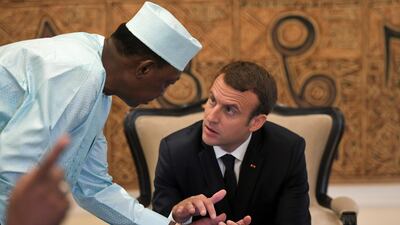BAMAKO, MALI // On a lightning visit Mali, French president, Emmanuel Macron, threw his weight behind a planned five-nation force to fight extremism in the Sahel.
But he warned the so-called "G5 Sahel" countries - Burkina Faso, Chad, Mali, Mauritania and Niger - that it was up to them to make it effective and successful.
The five countries have pledged to set up a joint force to combat the wave of Islamist bombings, shootings and kidnappings south of the Sahara. President
Macron, joining the heads of state in the Malian capital Bamako for a special summit, hailed the initiative as "a dynamic, a groundswell which France is proud to back".
But, he said, "it will be up to you and your armed forces to demonstrate that the G5 can be effective, while respecting humanitarian conventions. The results have to be there to convince your partners."
Based in Sevare in central Mali, the 5,000-strong G5 Sahel force aims to bolster 12,000 UN peacekeepers and France's own 4,000-member Operation Barkhane, which is operating in the region.
Mr Macron is also seeking extra backing from Germany, the Netherlands, Belgium and the United States -- which already has a drone base in Niger -- beyond the 50 million euros (Dh 209 million) pledged by the European Union, a sum he described as "the start of a long-term commitment".
Serge Michailof, a researcher at the Paris-based IRIS institute, described the EU contribution as "a joke" given the EU's "very deep pockets" and the poverty of the Sahel countries.
"This force is going to cost $300-400 million (Dh1.1 billion -1.4 billion) at the very least," he said. The foreign mnister of Mali, Abdoulaye Diop gave a figure of $450 million (Dh1.65 billion).
The president of Chad, Idriss Deby, has said his country cannot afford to mobilise large numbers of troops simultaneously for the UN peacekeeping mission and also for the new force.
Mr Deby and Mr Macron are due to meet on the sidelines of the Bamako summit to discuss the financial issue, according to the French presidency. Chad's military is widely viewed as the strongest of the five Sahel nations.
Al-Qaeda's Mali branch, meanwhile, offered a reminder of the jihadists' threat, with the release of a proof-of-life video of six foreign hostages.The clip posted on Saturday by Nusrat Al Islam wal Muslimeen, also known as the Group to Support Islam and Muslims, includes elderly Australian surgeon Arthur Kenneth Elliot..
Mr Macron visited Gao in northern Mali in May, his first foreign trip outside Europe as president, and promised that French troops would remain "until the day there is no more Islamic terrorism in the region".
France intervened to drive out militants linked to Al-Qaeda who had overtaken key northern cities in Mali in 2013.
That mission evolved into the current Barkhane deployment launched in 2014 with an expanded mandate for counter-terrorism operations across the Sahel.
The new Sahel force will support national armies trying to apprehend extremists in a region with porous frontiers, and will work closely with Barkhane.
A source in the French presidency said operations across Burkina Faso, Niger and Mali, all frequently hit by extremist attacks, will be coordinated with French troops, and help would be given to set up command centres.
In assessing the challenges of the G5 Sahel operation, analysts frequently compare it with the Multinational Joint Task Force - composed of troops from Benin, Cameroon, Chad, Niger and Nigeria, which is battling the Nigerian jihadist group Boko Haram in the Lake Chad region..
Despite heavy initial criticism, that force "has succeeded in a part of its mission, which is to reduce the territory controlled by Boko Haram and limit its actions," said Rinaldo Depagne from the International Crisis Group, a non-governmental organisation that works on conflict resolution.
However, the G5 Sahel force faces other challenges. The armed forces of Burkina Faso and Mali are weak while Chad and Niger are already engaged on multiple fronts, he added.
The three-nation border of Liptako-Gourma will become a "laboratory" for Burkina Faso, Mali and Niger where French forces will aim to work in tandem with these nations, before bringing Chad and Mauritania into the mix, Mr Depagne predicted.
The G5 Sahel force's top commander, Malian general Didier Dacko, has said that at first each country's contingent would operate on its own soil, gradually becoming more focused on their mutual borders.
Agence France-Presse

